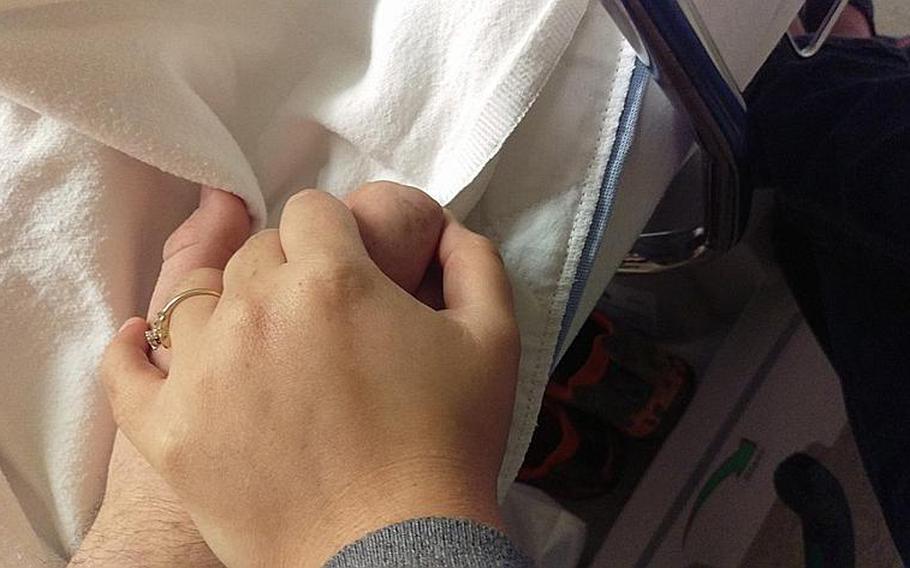
Rachel Moyers and her Air Force veteran husband, Matt, hold hands in the hospital. (Rachel Moyers)
Stars and Stripes is making stories on the coronavirus pandemic available free of charge. See other free reports here. Sign up for our daily coronavirus newsletter here. Please support our journalism with a subscription.
Recently, when asked by the U.S. Centers for Disease Control and Prevention whether they had seriously considered suicide in the last 30 days, over a quarter of young adults answered “yes.” As a caregiver to an injured veteran, I understand where they’re coming from. Isolation is a silent destroyer of mental health, making you believe community is non-existent. As we observe World Mental Health Day on Saturday, I’m here to tell you, the road isn’t easy, but through building communities of support, we can get through this together.
My husband Matt and I eloped in South Korea. I flew to visit him for Christmas, while he was stationed there, and next thing we knew, we were married. Our marriage started from such a place of love. But things changed after my husband deployed to Iraq. When he came home, depression creeped in.
Matt went from preparing for battle abroad to a new battle at home. Before he even took his first steps out of bed, he had physical pain and nightmares. He would have outbursts, then ruminated on his guilt and isolated from us. When he tried to enter the workforce, he became more disconnected. I remember him asking me, “How can I go from the military where my colleagues keep me alive to a workforce where someone acts like the world is ending when staples run out?” He felt as if the military kept going, while he faded into the background. That was when his depression led to suicidal ideation. Instead of rushing to the altar, I was now rushing him to the emergency room. I’d drop him off and cry. I’d cry because I couldn’t fix it. I’d cry for our kids. I would isolate myself because of the stigma.
Prior to 2020, this was our reality, a daily battle. But this year, we’ve come to realize that with each new challenge we face, we add one new arrow of resiliency to our quiver.
1) Everyone struggles. Although my husband Matt was struggling, behind the scenes, I felt pain too. As his caregiver, I was his pillar of strength, but that pressure started to eat at me. If one pillar is struggling, the other pillar now has added weight to keep the house standing. That is why we learned to evenly distribute that stress. We also learned to not frame our own trials as unfit. Just because we struggle doesn’t mean we are unfit parents, unfit spouses, unfit people. It doesn’t mean we are broken — it means we need support.
2) You get a seat at the table. For so long, I put my husband’s and children’s needs before my own and I’ve come to realize that, although I’ll never put myself first, I don’t have to be last. The fact is, I don’t have to be in front, but I do need to be alongside them. Yes, I’m a mom, a wife and a caregiver but I believe that personal identity extends beyond my roles. Tell yourself daily, you are worthy to pull up your seat at the table.
3) Draw strength from your community. This year has isolated people all around the globe from their community. As a caregiver, I work with the American Red Cross Military and Veteran Caregiver Network. We provide online communities that offer judgement-free spaces for caregivers to share their true feelings of worry, stress, resentment, guilt and fear. We work on developing a proactive approach to balance the mental health of both you and your veteran. And sometimes just having someone with you online and letting you exist without judgment is needed. I urge you, whatever your community may be, draw your strength from them.
4) Take time. You’ve heard it said, “take it day by day.” I’m telling you, sometimes you have to take it minute by minute. There are no specific right or wrong ways through the chaos — just focus on the next step. Take a second and celebrate your small victories. Sometimes just getting out of bed is a huge win. One way is through intentional acts of kindness, this injects real purpose into us.
I know this year has been tough and looks like there’s no end, but there are steps to help you find that light. Take a breath, know your worth, find your community online and plan your right next steps.
Rachel Moyers, a caregiver to her Air Force veteran husband, is the Outreach and Engagement Associate at the American Red Cross Military and Veteran Caregiver Network.